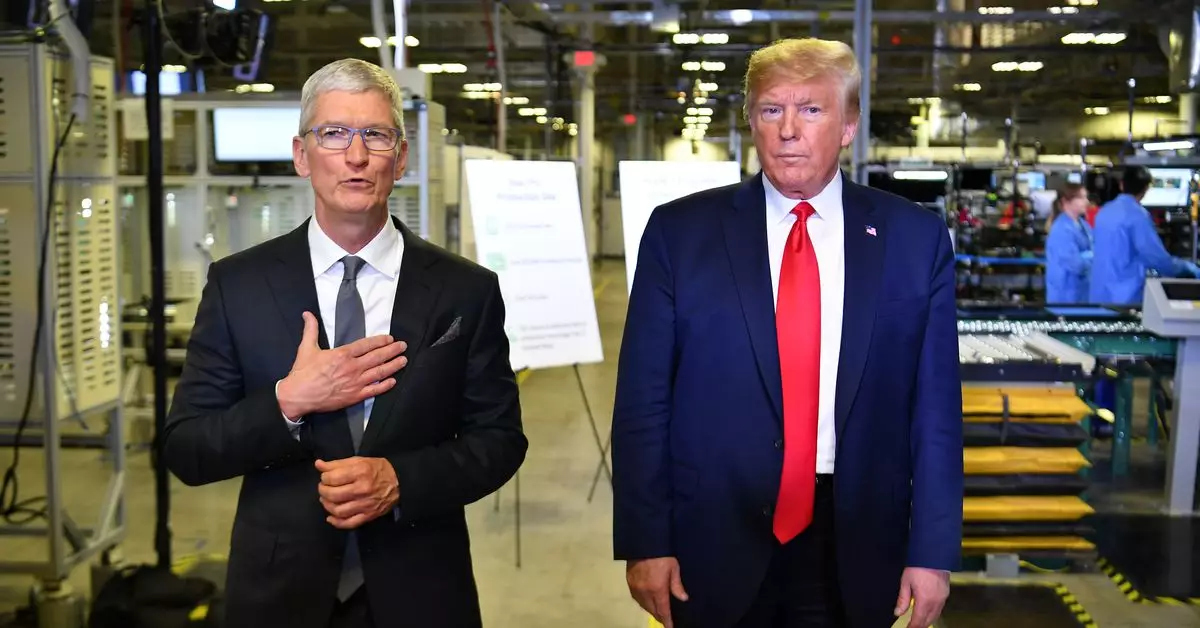In an era where technology firms often struggle to navigate the complex landscape of political relationships, Apple CEO Tim Cook’s successful rapport with Donald Trump during his presidency stands out as a notable exception. The Wall Street Journal recently highlighted Cook’s distinctive approach, a strategy that has sparked intrigue among other corporate leaders seeking to cultivate similar ties. This article explores the depth and implications of Cook’s strategy, examining its effectiveness in influencing policy while also analyzing the broader context for tech firms in their interactions with government officials.
Cook eschewed the traditional methods of lobbying that many corporate executives rely on, opting instead for a more direct and personal approach. According to the Journal, he engaged Trump through straightforward phone calls and in-person meals, forgoing the layers of bureaucratic intermediaries. This is a bold departure from the norm, suggesting that authenticity and personal rapport can yield more impactful results. By maintaining this direct line of communication, Cook was able to present his case succinctly, often narrowing discussions to one compelling data point that resonated with Trump’s priorities. Such a focused approach not only streamlined discussions but also minimized the chances of the dialogue being sidetracked by extraneous issues.
At the core of Cook’s strategy was the ability to identify and leverage areas of mutual benefit. By aligning Apple’s interests with Trump’s agenda, Cook managed to create win-win scenarios that appealed to both parties. For instance, his efforts in influencing tax policies and tariffs were not just about securing favorable conditions for Apple; they also allowed Trump to showcase achievements that supported American businesses. This strategic alignment is crucial because it underscores the idea that effective communication is not solely about what one can extract from the relationship; it’s equally about creating value for the other party involved.
As Cook’s playbook is examined by leaders across various sectors, including aerospace and shipping companies like Boeing and FedEx, it raises critical questions about the ethical boundaries of corporate influence in politics. Can companies engage with political leaders without compromising their values? As exemplified by Cook’s relationship with Trump, some tech executives, like Sundar Pichai and Mark Zuckerberg, have attempted to forge connections through public praise of the former president. This trend highlights a delicate balance—business leaders navigate the fine line between flattery and genuine support while aiming to advance their corporate agendas.
Moving forward, the tech industry must ponder the implications of such relationships. While Cook’s approach has yielded positive outcomes for Apple, it may not necessarily be a one-size-fits-all method for all companies. The experiences of other executives in reaching out to Trump could play out differently, as political dynamics are ever-evolving and context-specific. Ultimately, as Cook demonstrated, establishing a personal connection may lead to significant advantages in policy influence, yet the integrity of such interactions will remain under scrutiny. As tech leaders continue to explore avenues for dialogue with political figures, it is essential that they navigate these waters thoughtfully, ensuring that their strategies foster collaboration without undermining their commitments to ethical standards.

